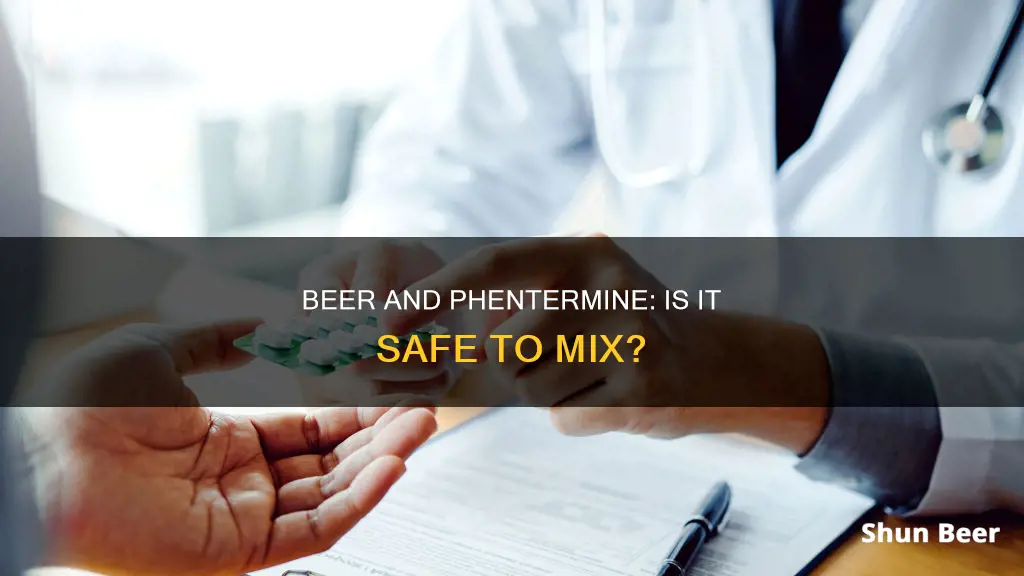
Phentermine is a prescription medication used to aid weight loss. It is a central nervous system stimulant that suppresses the appetite and boosts energy levels. However, it also has several side effects, including a dry mouth, hair loss, acne, and more serious adverse health outcomes such as changes to normal heart rhythm. When mixed with alcohol, these side effects can be aggravated, and the medication's effectiveness is reduced. Alcohol also adds further calories, which can counteract the weight-loss benefits of phentermine. As such, it is strongly recommended to abstain from alcohol while taking phentermine.
Can I drink beer while taking phentermine?
| Characteristics | Values |
|---|---|
| Cardiovascular side effects | Increased heart rate, chest pain, blood pressure changes, heart failure |
| Central nervous system side effects | Dizziness, drowsiness, depression, difficulty concentrating, impaired judgment, impaired coordination, memory loss, impaired recall |
| Gastrointestinal side effects | Nausea, stomach pain, diarrhea, constipation |
| Other side effects | Headache, impaired balance, impaired communication, speech issues, psychological dependence, liver function and metabolism issues |
| Weight loss impact | Alcohol may reduce the effectiveness of phentermine for weight loss |
| Alcohol-related risks | Alcohol use disorder, overdose, alcohol calories leading to weight gain |
What You'll Learn

Cardiovascular complications
Phentermine is a prescription weight-loss drug that is often recommended to people whose obesity is affecting their health. It is a stimulant that increases norepinephrine in the central nervous system (CNS), thereby suppressing appetite. It is similar to amphetamines in its chemical composition and has the potential to cause harmful side effects even when taken alone.
When combined with alcohol, the risk of cardiovascular side effects increases. These include:
- Increased heart rate
- Abnormal increases in blood pressure
- Heart failure (in those with an underlying condition such as heart disease)
- Chest pain
- Syncope
- Arrhythmias
- Stroke
- Myocardial infarction
People with cardiovascular disease or conditions affecting the heart and lungs should not take phentermine. This includes those with:
- Congestive heart failure
- Coronary artery disease
- Cardiac structural abnormalities
- Cardiomyopathy
- Cardiac arrhythmia
- Coronary heart disease
- Uncontrolled hypertension
Phentermine is also known to cause other cardiovascular complications, including pulmonary hypertension and valvular heart disease.
Additionally, the combination of phentermine and alcohol can lead to central nervous system (CNS) side effects, such as:
- Dizziness
- Drowsiness
- Depression
- Difficulty concentrating
It is important to note that the effects of phentermine can last up to 72 hours in the body, so it is generally recommended to avoid alcohol entirely while taking this medication.
Is Expired IPA Beer Drinkable?
You may want to see also

Gastrointestinal issues
Phentermine is a prescription medication used to aid weight loss. It is a central nervous system stimulant that suppresses the appetite and boosts energy levels. It is typically prescribed for short-term use only.
Drinking alcohol while taking phentermine is not recommended due to the potential for adverse health effects and the reduced effectiveness of the medication. The combination of phentermine and alcohol can cause gastrointestinal issues, including:
- Nausea
- Stomach pain
- Diarrhea
- Constipation
These symptoms occur because alcohol irritates the lining of the stomach and digestive tract, which can be made worse when combined with phentermine. This can lead to acid reflux and other unpleasant digestive symptoms.
To minimize the risk of gastrointestinal problems and other side effects, it is generally advised to avoid consuming alcohol while taking phentermine. If you choose to drink, it is recommended to wait at least 12 hours after taking your last dose of phentermine to allow enough time for the medication to leave your system. However, due to the potential for overlapping side effects and the negative impact on weight loss, complete avoidance of alcohol is typically recommended during the treatment course.
Beer Drinking and Avoiding the Gut
You may want to see also

Central nervous system problems
Phentermine is a prescription weight loss drug that is typically prescribed for short-term use. It is chemically similar to amphetamines and stimulates the central nervous system. This means that it increases your heart rate and blood pressure and decreases your appetite.
Mixing phentermine with alcohol can increase the risk of cardiovascular side effects such as an increased heart rate, chest pain, or blood pressure changes. It can also increase the risk of central nervous system side effects, such as:
- Dizziness
- Drowsiness
- Depression
- Difficulty concentrating
- Problems with sexual function
- Headaches
- Nausea
- Vomiting
- Tremors
- Seizures
- Lack of coordination
- Impaired mental ability
- Mood swings
- Irritability
- Anxiety
- Psychosis
- Confusion
- Behavioural changes
As such, it is recommended to avoid or limit alcohol consumption while taking phentermine.
Liver Biopsy: Drinking Beer, Safe or Not?
You may want to see also

Psychological dependence
Phentermine is a prescription weight loss drug that is chemically similar to the stimulant drug amphetamine. It is typically prescribed for short-term use to individuals with a body mass index (BMI) of over 30, indicating clinical obesity. Phentermine is known to increase heart rate and blood pressure and is therefore not recommended for those with cardiovascular issues.
Alcohol, on the other hand, is a depressant that affects the central nervous system. It slows down communication between nerve cells in the brain and can impact the liver, cardiovascular system, and immune system.
Combining phentermine and alcohol can increase the risk of developing psychological dependence on either substance. Both substances have addictive properties, and when used together, they may reinforce addictive tendencies and potentially lead individuals into a cycle of dependence. This is because the simultaneous effects of phentermine and alcohol on the central nervous system can lead to unpredictable reactions and dangerous situations.
The conflicting effects of phentermine and alcohol on the central nervous system can result in impaired judgment, reduced coordination, and memory loss or impaired recall. These effects can increase the risk of accidents or injuries and may have long-term consequences on memory and cognitive abilities.
Additionally, both phentermine and alcohol are metabolized by the liver. When combined, they may put extra strain on the liver, potentially impacting its function and leading to negative effects on liver health.
To minimize the risk of psychological dependence and other adverse effects, it is recommended to avoid consuming alcohol while taking phentermine. This ensures optimal safety and effectiveness of the treatment. If individuals have any concerns or questions about the use of phentermine and alcohol, they should consult their healthcare provider for personalized advice and guidance.
Beer and Coronavirus: What's Safe to Drink?
You may want to see also

Liver function and metabolism
Phentermine and alcohol are both metabolized by the liver. The liver plays a crucial role in metabolizing medications and removing toxins from the body. When the liver is burdened with processing alcohol and phentermine simultaneously, it may not function optimally, leading to potential negative effects on liver health.
The liver is responsible for breaking down medications and toxins into smaller molecules that can be eliminated from the body. When phentermine and alcohol are taken together, the liver has to work harder to process both substances. This additional workload can impact the liver's ability to function effectively.
Phentermine is a prescription weight-loss medication that is often recommended to people whose obesity is affecting their health. It is typically prescribed for short-term use, along with a healthy diet and exercise regimen. Alcohol, on the other hand, is a depressant that affects the central nervous system. It slows down the communication between nerve cells in the brain, producing its characteristic relaxing and sedative effects.
When phentermine and alcohol are combined, they can have conflicting effects on the body. Phentermine is a stimulant that suppresses appetite, while alcohol is a depressant. This combination can lead to adverse effects and compromise the intended purpose of the medication.
The simultaneous consumption of phentermine and alcohol can enhance the occurrence of side effects associated with both substances. Phentermine may cause side effects such as dizziness, drowsiness, and difficulty concentrating. Alcohol can also produce similar effects on the central nervous system. When these substances are combined, the risk of experiencing heightened side effects increases, resulting in extreme drowsiness, impaired judgment, and reduced coordination.
It is crucial to prioritize liver health and follow the guidance of a healthcare provider when considering the consumption of phentermine and alcohol. The combination of these substances may increase the risk of adverse effects on the liver, and a healthcare provider can provide personalized advice and guidance based on individual circumstances.
Beer's Power: Removing Trapped Gas, Always
You may want to see also
Frequently asked questions
No, it is strongly recommended to abstain from alcohol while taking phentermine. Combining phentermine and alcohol can increase the risk of severe side effects, including cardiovascular issues, liver function and metabolism complications, and impaired judgment.
The combination of phentermine and alcohol can lead to various side effects, including gastrointestinal problems, cardiovascular complications, impaired judgment, liver function and metabolism issues, and central nervous system effects such as dizziness and drowsiness.
Phentermine is a prescription weight loss medication that suppresses appetite and boosts energy levels. Alcohol, on the other hand, is a depressant that affects the central nervous system and can reduce your drive to exercise and make healthy food choices. Drinking alcohol while taking phentermine can lower your chances of successful weight loss and increase the risk of unpleasant side effects.
If you wish to continue drinking beer, it is important to consult your healthcare provider to discuss alternative weight loss medications or strategies that do not interact with alcohol. It is crucial to prioritize your health and well-being by making informed decisions and seeking personalized advice.







